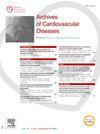First-Trimester Screening for Severe Congenital Heart Defects in High-Risk Fetuses: The French PréCaFoet Study
IF 2.2
3区 医学
Q2 CARDIAC & CARDIOVASCULAR SYSTEMS
引用次数: 0
Abstract
Introduction
Congenital heart defects (CHDs) are among the most common congenital anomalies, with significant postnatal mortality. Prenatal detection is crucial for preparing parents and healthcare providers for prognosis and management. In France, since 2022, the CNEOF guidelines recommend first-trimester cardiac ultrasound screening for all pregnancies, including low-risk cases. However, limited studies have evaluated the diagnostic accuracy of this approach in non-tertiary care settings.
Method
The PRéCaFoet study was a prospective multicenter cohort study conducted from November 2020 to May 2024 across 12 French centers. It aimed to assess the diagnostic performance of first-trimester screening for severe CHDs in high-risk pregnancies. Inclusion criteria included increased nuchal translucency (> 3.5 mm), first-degree family history of CHD, or suspicion of cardiac or extracardiac anomalies during routine first-trimester ultrasound. Diagnostic performance was evaluated using sensitivity, specificity, positive predictive value (PPV), and negative predictive value (NPV) compared to gold-standard second-trimester ultrasound or fetal autopsy.
Results
Among 401 eligible pregnancies analyzed, 375 had conclusive first-trimester reference ultrasounds (Echo Ref T1). Severe CHDs were detected in 33 fetuses at T1 and confirmed in 30 at T2. Sensitivity and specificity for severe CHD detection at T1 were 83.3% and 93%, respectively, with a PPV of 58.1% and an NPV of 98%. Sequential screening (Echo Ref T1 followed by fetal echocardiography in abdnormal or inconclusive cases) reduced non-contributive cases from 5.7% to 2.8%. Prognostic evaluation revealed significant uncertainties: among 40 severe CHD cases, cardiac type (univentricular vs. biventricular) remained undetermined in 37.5%, and curability could not be assessed in 37.5% of cases. Detection rates varied by defect type: univentricular defects (87.5%), transposition of the great arteries (100%), atrioventricular canal defects (75%), tetralogy of Fallot (50%), ventricular septal defects (25%), and total anomalous pulmonary venous return (0%).
Conclusion
First-trimester screening for severe CHDs demonstrated high sensitivity and specificity in a high-risk population within a non-tertiary care network. However, prognostic assessment at T1 proved challenging, with inconclusive classifications in over one-third of cases, underscoring limitations in early counseling for complex defects.
高危胎儿严重先天性心脏缺陷的妊娠早期筛查:法国pracei研究
先天性心脏缺陷(CHDs)是最常见的先天性异常之一,具有显著的产后死亡率。产前检测是至关重要的准备家长和医疗保健提供者的预后和管理。在法国,自2022年以来,CNEOF指南建议对包括低风险病例在内的所有妊娠进行妊娠早期心脏超声筛查。然而,有限的研究评估了这种方法在非三级医疗机构中的诊断准确性。pr cafoet研究是一项前瞻性多中心队列研究,于2020年11月至2024年5月在法国12个中心进行。目的是评估妊娠早期筛查对高危妊娠严重冠心病的诊断效果。纳入标准包括颈部透明度增高(> 3.5 mm),有冠心病家族史,或在妊娠早期常规超声检查中怀疑心脏或心外异常。与金标准的中期妊娠超声或胎儿尸检相比,通过敏感性、特异性、阳性预测值(PPV)和阴性预测值(NPV)来评估诊断性能。结果在401例符合条件的妊娠中,375例有结论性的妊娠早期参考超声检查(Echo Ref T1)。T1时发现重度冠心病33例,T2时确诊30例。T1时检测重症冠心病的敏感性和特异性分别为83.3%和93%,PPV为58.1%,NPV为98%。序贯筛查(在异常或不确定的病例中,在超声心动图之后进行胎儿超声心动图检查)将非致病病例从5.7%减少到2.8%。预后评估显示了明显的不确定性:在40例严重冠心病患者中,37.5%的患者心脏类型(单室vs双室)仍未确定,37.5%的患者无法评估其治愈率。检出率因缺陷类型而异:单室缺陷(87.5%)、大动脉转位(100%)、房室管缺陷(75%)、法洛四联症(50%)、室间隔缺陷(25%)和肺静脉总异常回流(0%)。结论:在非三级医疗网络中的高危人群中,妊娠早期重度冠心病筛查具有较高的敏感性和特异性。然而,T1的预后评估被证明是具有挑战性的,在超过三分之一的病例中不确定的分类,强调了对复杂缺陷的早期咨询的局限性。
本文章由计算机程序翻译,如有差异,请以英文原文为准。
求助全文
约1分钟内获得全文
求助全文
来源期刊

Archives of Cardiovascular Diseases
医学-心血管系统
CiteScore
4.40
自引率
6.70%
发文量
87
审稿时长
34 days
期刊介绍:
The Journal publishes original peer-reviewed clinical and research articles, epidemiological studies, new methodological clinical approaches, review articles and editorials. Topics covered include coronary artery and valve diseases, interventional and pediatric cardiology, cardiovascular surgery, cardiomyopathy and heart failure, arrhythmias and stimulation, cardiovascular imaging, vascular medicine and hypertension, epidemiology and risk factors, and large multicenter studies. Archives of Cardiovascular Diseases also publishes abstracts of papers presented at the annual sessions of the Journées Européennes de la Société Française de Cardiologie and the guidelines edited by the French Society of Cardiology.
 求助内容:
求助内容: 应助结果提醒方式:
应助结果提醒方式:


